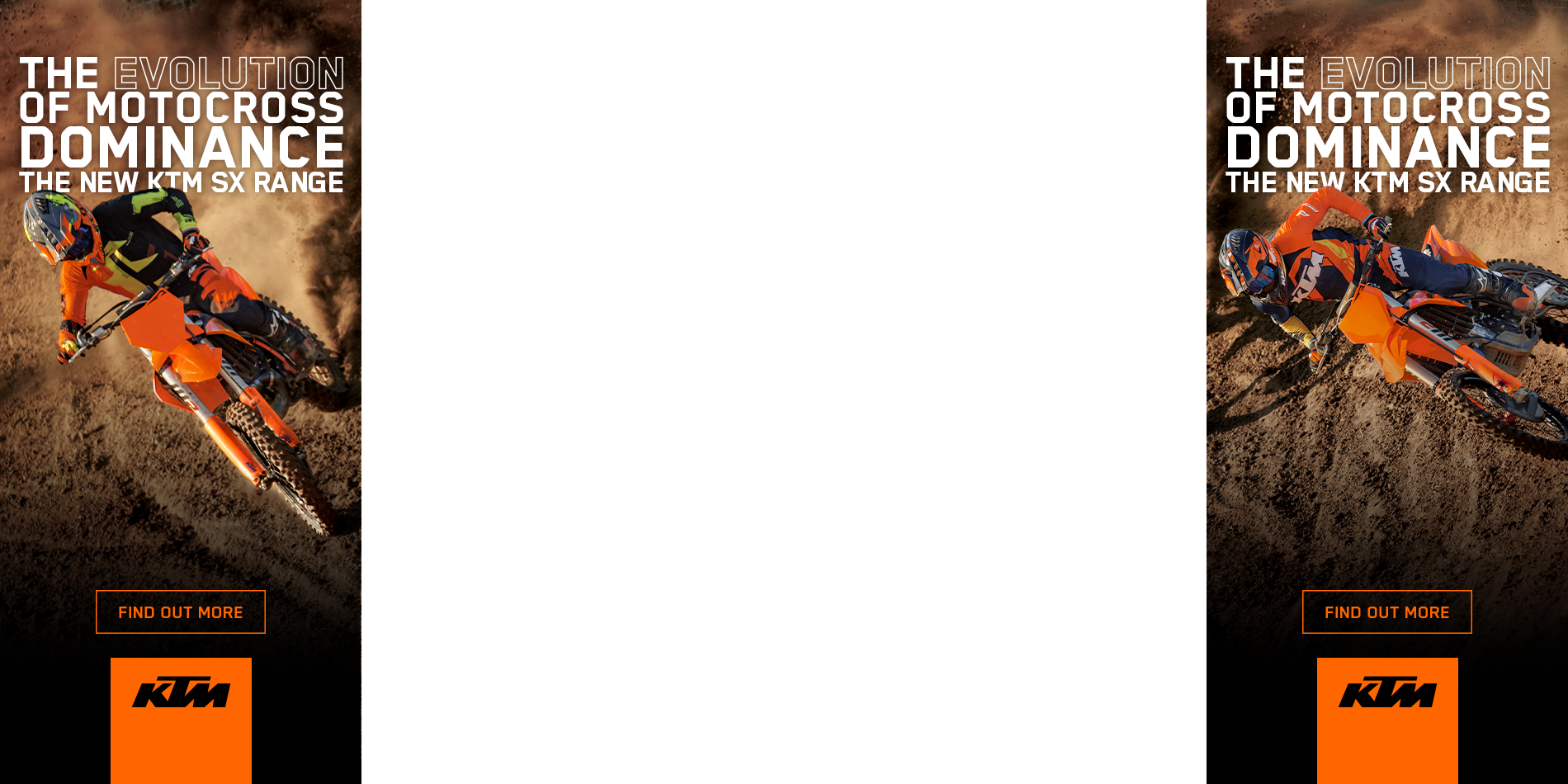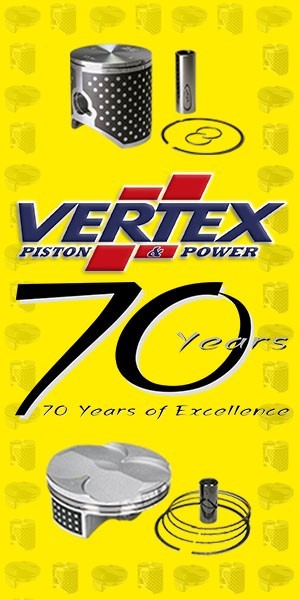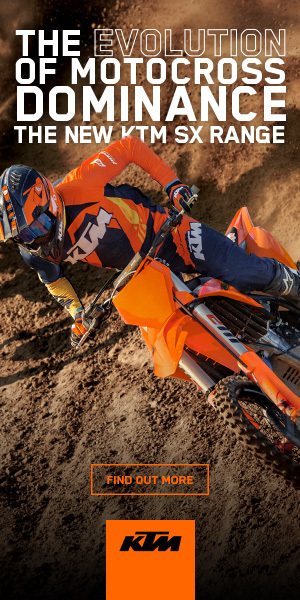Ryan Villopoto interview - Legend
Posted on February 05, 2024
Eric Johnson is without question, the best motocross journalist in America, in fact, the best ever in my opinion. His writing skills and humble character is something we call old school attitude, and honestly, not something we see much anymore within the media.
Guys like Johnson and Great Britains Jack Burnicles are the only two MX media I know who were actually really creative in their writing, naturals you could even say. Not from a school book journalism, but just very talented. Below is a cool interview Johnson did with former AMA champion, Ryan Villopoto.
Ryan Villopoto - The Interview
I first met Ryan Villopoto in August 2002 when he was a 13-year-old kid competing in the 85cc Modified (9-13) class at the AMA Amateur National Motocross Championship in Tennessee. Nobody on the fence watching Villopoto take on then factory Honda Minicycle pilot Mike Alessi that afternoon knew who the Brothers Powersports Yamaha privateer was.
Three years later at Broome-Tioga Sports Center in New York and on a Kawasaki KX250F, Villopoto made his AMA Pro Racing debut and powered on to a nine-year professional career where he’d become a four-time 450cc AMA 450cc Supercross champion as well as a four-time AMA 450cc Motocross champion before calling it quits.
But that hasn’t changed his love of the sport, as he explains while hanging out with the Monster Energy/Pro Circuit/Kawasaki Supercross team…
EJ: Do you still feel the rush of being at the races?
Villopoto: It’s a lot of fun. The older I get the more I enjoy being able to come here to these races and hang out with everyone. I guess when I first retired I really didn’t go to a lot of races or do much for about two years. So I had a two-year hiatus from the sport. Then once I started coming back a little more, I really kind of got back into the swing of things.
We have tons of friends here, right? It doesn’t matter. It’s Frankie Latham from KTM or the guys over a Gas Gas or the guys that have gone around like Zach White. Zach used to be the engine person here at Pro Circuit and he left to do some TRD stuff for a while and he’s now back at KTM. I’m good with everybody and it’s just so good to be able to see all of the guys. It’s just fun being able to come back and see everybody and just hang out here with no pressure.”
Q: Do you still feel the race day nerves?
Villopoto: No, I have no nerves. I’m just here to enjoy it. No nerve for me.”
Q: You were a very serious guy when you were racing…
RV: Yeah, you have to be. I know we have a lot of past race winners and a lot of few past champions out there, but I think the difference you see from myself or Ricky Carmichael or Ryan Dungey is that when you live inside of that box of winning races every single year and winning championships multiple years on end, it can get real tough. We raced for 17 rounds and I was that same person for 17 rounds. There was no, “Hey, I’m out of the points. I’m just here for race wins.” I was never out of the points. I was always in it to win the championship. I think that’s what was different too.
Q: In being a factory-backed motorcycle racer it’s all on you when you get on the bike. The whole race team, the whole organization back in Japan, all the sponsors, the results, it’s all on you. That’s gnarly for any young professional racer, isn’t it?
RV: It was not easy. I mean we have these big trucks and we have all these new members and suspension guys and motor guys and tire guys and all this personnel, but the one thing with racing, and especially with two-wheel sports like motocross, Supercross and Moto GP, once you go down to the line, you are a standalone guy. And the beauty of our sport is to that you don’t have to have the best machine to win. Moto GP, if you are some horsepower down, you’re not winning, right? Same with car racing. But for us, Supercross and motocross, you can win on a motorcycle that might not be the best. We can use Kenny Roczen for example. He’s still riding that Suzuki that still has a kick starter. Suzuki is the last manufacturer out there left with a kick starter. That doesn’t mean the bike is bad. But once again, it’s probably not the best motorcycle. Kenny is capable of winning and I think Kenny wins at least one to two races this year.
Q: What’s your take on the Supercross competition thus far in 2024?
RV: Well, it’s definitely made the season interesting so far. The points are really close. Anaheim 1 was Anaheim 1 and always with a lot of pressure and a lot of riders maybe didn’t ride their best. They find out where the bike needs to be better after that first race and then we go to San Francisco for a full mud race. Then came San Diego — definitely a raceable track, but not great conditions. All of this has definitely kept things very interesting so far.
Q: Five, six or seven guys can win on any given Saturday, right?
RV: Totally. And it’s good to see that we now have one new manufacturer in Beta. We have Triumph starting with the East Coast Supercross Series, which will be the second new manufacturer in the sport. And then everybody saw the news of Ducati coming into the sport. For Triumph and Ducati to spend the money that they’re doing to develop motorcycles and get into this industry. things are on the rise and ramping up. Clearly there’s a reason why they’re getting into this space.
Q: Eli Tomac… Can he still win?
RV: I think Eli is in it for the long haul, for sure. Look, I can’t speak to where Eli is at in his career. I never had kids when I raced and that’s uncharted territory for me. Eli is coming off of his Achilles injury and has been riding really well and I don’t think we’ve seen the best of Eli yet in 2024. I think Eli was kind of feeling it out at first. Obviously, we’ve had two mud races too, so that really did not help. I know Eli is going to win some races this year and you just can’t count him out.
Q: How about Jett Lawrence?
RV: It’s good. I like Jett. I like everything that he’s about. Our sport needs that. The same with Haiden Deagan. Our sport needs these young kids and they need to be who they want to be like. I think the era is kind of changing from the way that I came. When I was professional and when I was top of the 450 class, we definitely lived inside of a box. I love to see the character of these guys coming out. They’re being more themselves and that’s one thing that our sport has been missing. These younger guys are going to change that.”
Q: What do you think, looking back on your body of racing work?
RV: I couldn’t change anything about it. I mean sure, I’d go back and change losing the 2008 Lites championship to Trey Canard. I can’t change the outdoor rounds or outdoor races or racing series that I missed because of knee injuries. Honestly, though, if I go back and look at it, the older I get the more I appreciate it.
And my boys are doing this now. Having them go on YouTube and see that stuff I did now that I’m 35 years old is awesome. But for me, I’m like, “Dude, to accomplish what I did and win as much as I won, that was pretty gnarly.” I mean, I sit in a category of Jeremy McGrath of doing four championships in a row. I’m the only other one to do four in a row. It definitely is really, really, really cool.”
Q: The 2007 Motocross of Nations at Budds Creek, Maryland — I’ve been around racing my entire life and to this day, that’s the greatest single racing performance I’ve ever seen. I was standing behind the starting gate with Ryan Dungey when you came roaring out of the woods on the opening lap of the race. You were untouchable that day.
RV: Yeah, it couldn’t have gotten any more perfect. And then everything for Team USA was also perfect, right? Home soil and everybody pulled their weight. I always really liked Budds Creek. There and Glen Helen were really good to me over the years. And yeah, man, I think that for whatever reason, it was a perfect day at the Budds Creek Motocross of Nations. It was like “The Matrix” and things were happening slow — I could dodge all the bullets. I could see the things coming almost before they happened.
Q: All you guys retire so early with most of your life in front of you. You left the sport in a very good place. Not everybody does.
RV: Well, I think it might be easier for the guys that didn’t make a huge amount of money during their careers. The reason why I say it’s easier for guys that don’t have a big old bankroll a cash in the bank is because when they stop racing, they might have a nice little nest egg put away, but they need to go back to work to some degree, right? If I had to do that and go back to work, I would do it. I’m going to make it work. I’ll find my position and I’m going to run with that.
I’ll use Wil Hahn for example. Wil was the 250 East Coast champion in 2013 and also rode the 450 at Kawasaki for a couple of years. Wil probably put up a nice little nest egg in the bank but he also had to get a job when he retired, you know? Now he’s the Gas Gas team trainer. My point is that when I’d retired at 27, I didn’t have to work and I still don’t have to. And for the first 18 months of my retirement, I did not have any responsibilities. We didn’t have the kids yet. It was a lot of fun. I woke up when I woke up and went to the bar when I wanted to go to the bar and did this or had to go there and do that or whatever. I did whatever I wanted to. It was a lot of fun.
After that eight months, you know, the teenager kind of wears off. Then it is like, “OK, what am I going to do now?” And then you start looking at it like, “Well, I can do this! I’ve got I got enough money, maybe I’ll buy this! Maybe I’ll start a coffee shop!” Those are all great things, but it’s also because we start our careers so young. And when I mean young, I’m talking racing on 60cc and 80cc bikes. So we live inside that for so long because it’s the only thing we know, right?
Q: So what do you have going on these days?
RV: I’m with Yamaha and bLU cRU and Monster Energy and Fasthouse and it all keeps me busy. Next month I’m going to Colorado for Yamaha for a Tenere 700 Ride. It’ll be four days of trails. When I did the Yamaha deal, obviously it was a brand-new company to work with. We were both learning each other and then all of a sudden COVID hit. Then in the last two years we’ve really found our stride. Damon Bradshaw and I are both Yamaha guys and we have a really good gig. I don’t really want to be on the motorcycle track very often. I want to go and ride the trails and do the side-by-sides and with Yamaha, with all the different platforms they have, it’s a lot of fun.
We’ve also been working on the “Title 24” podcast. We’re building that with NBC and myself and Ricky [Carmichael]. That’s a lot of fun too. On Monday we are able to dissect and talk for an hour and 15 minutes about the racing weekend and give our insight on all of it.
Q: You went overseas to compete in MXGP in the twilight of your racing career. What do you think when you reflect back of that project? I was around you then and it all seemed sort of rushed.
RV: If I could say there was any regret with my career, that would have been something that I wish would have gone maybe a little bit differently. I’m not even meaning winning a world championship. But like you said, it was really, really rushed. I’m gonna be honest, the team was wasn’t ready for me to come over there. Everything was totally different. And I think as an American to go to Europe, you couldn’t ask for anything harder. It’s way easier for a European to come to the U.S. It was all so very different. I loved the architecture and I loved the food and the history. So that was a lot of fun.
The few races that I did do — Thailand, Qatar, Argentina — I really liked. I did crash and get hurt. Some of those races I did were in some of the most beautiful places in the world. It was all definitely something that I wish I wish I could have done more seasons of it. It just wasn’t in the cards for me mentally. I didn’t want to live inside of that pressure cooker anymore of producing to win and even when I went over there to a new series like MXGP, I still was expected to win.
Ricky and me, we talked about that the other day, Ricky said that we were both bred to win, you know? I think that’s what the difference is today. That’s why we see guys racing longer today. It is because they’re not in it every single weekend for the win like Ricky and I were. We were there to win championships, you know? We were there to win 17 rounds.
I think there’s a different mentality too. Like, you can go in and a race a smart race and maybe only win five races and win the championship. That’s a great way to play the chessboard too. I didn’t play the chess game like that. Ricky didn’t either. When we lined up behind the gate, it was not like do or die but we were going to try to win at all costs every single time. Look, man, I won 11 races in one season. That’s over half the races. That’s a lot of winning to do and live in that pressure.
Q: Your dad Dan passed away back in 2018. I’m certain your dad would have been thrilled to work alongside you and your sons Brax and Gage.
RV: Exactly, yeah, he’d be stoked to do it with the kids. And it just makes everything way harder without him. Especially racing. You know, l could have him working on bikes and washing bikes and changing tires and whatever else it was and I would be right there with him and helping them. Now it’s all on my own and I gotta look for a mechanic…













